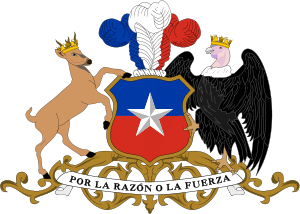Chilean nationality law

Chilean nationality law is based on both principles of jus soli and jus sanguini. Nationality law is regulated by Article 10 of the Political Constitution of the Republic of Chile.[1]
Birth in Chile

Any person born in Chile acquires Chilean citizenship at birth. The only two exceptions apply to children of persons in the service of a foreign government (like foreign diplomats) and to the children of foreigners who do not reside in the country. However, these children can apply to acquire Chilean nationality.[2]
Chilean citizenship by descent
Children of Chilean citizens born abroad acquire the Chilean nationality at birth, if any of their parents or grandparents were Chilean through the principle of jus soli or naturalisation.[1]
Naturalization as a Chilean citizen
Foreigners may apply for Chilean citizenship if they meet the following criteria:[1]
- permanent residence in Chile
- five years continuous residence in Chile.
- Chile allows dual citizenship
Reclamation of the Chilean nationality
If any administrative authority should deprive a person of their Chilean nationality, it can be reclaimed personally or by anyone on their behalf at the Supreme Court, according to Article 12 of the Chilean Constitution.
References
- ^ a b c Who's a Chilean? by Mario Sznajder
- ^ "Opción a la nacionalidad chilena". Departamento de Extranjería y Migración. Retrieved 2013-12-03.

